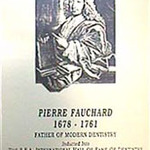Pierre Fauchard
Paris, France — 1678-1761
Fauchard, chirurgien dentiste of Paris was born in 1678 in Brittan in a very modest home. After training as a military surgeon he settled in Paris in 1719, where he remained until his death in 1761. Modern dentistry owes its greatest debt to a remarkable Frenchman who synthesized what was known in Europe about dentistry and presented in an organized form so that all colleagues of the profession could benefit from his book.
In 1723 he completed his epic work “Treatise on the Teeth”, which was not published until 1728. A second edition was printed in 1746. This was the most important book on dentistry to appear and it was to remain the authoritative work in the field during the next century. Translated into German in 1733, and then into English in 1946.
In Fauchard’s time it was customary for practitioners of the healing arts to guard their knowledge and skills jealously. But Fauchard despised such secrecy and to his financial detriment made his methods and practices public.
Aware of the weakness in the training of dentists in France, Fauchard decried the fact that the examining commission set up by the edict of 1699 lacked a skillful and experience dentist. Unfortunately his suggestion that a dentist also be on the examining board was not adopted.
In his great book Fauchard covered the entire field of dentistry and many of the ideas and procedures he advocated or described are still current today. He covered dental anatomy and morphology as well as anomalies of the teeth. He discussed tooth decay, its causes and prevention. He investigated oral pathology in great detail, citing numerous case histories and the treatment he rendered. Teething problems interested him greatly. He stressed how essential it is to retain primary teeth until it is time for them to be shed. He dealt with replantation of avulsed teeth and transplantation of teeth from one individual to another, anticipating John Hunter’s work by about forty years.
Fauchard’s understanding of periodontal disease was well in advance of the time. He was a firm believer in scaling teeth and debridement of root surfaces to prevent gingival disease. A strong advocate of preventive dentistry he recommended the use of mouthwashes as part of home care and gave many formulae for concocting them. Fauchard won great fame and respect in his lifetime. He separated dentistry from the larger field of surgery and set it on its own feet as an independent profession. He coined the term “Surgeon-Dentist” which is what the French call their dentist to this day. The great American dentist, Chapin A. Harris said,” Considering the circumstances under which he lived, Fauchard deserves to be remember as a noble pioneer and a sure founder of dental science.
On the 13th of November in 1880, at the inauguration of the Dental School in Paris, Dr. Louis Thomas expressed himself thus in address on the history of Odontology. “I have spoken of Pierre Fauchard, remember well that name, gentlemen, for with him opens a new era in the history of your profession.” Dr. J. Menzeis Campbell, honorary lecturer on Dental History from the University of Edinburgh wrote that,” The name of Pierre Fauchard, upon whom the title The Father of Modern Dentistry, has justly been bestowed, will endure when generations of dental pygmies will be entirely forgotten. By having so altruistically and successfully raised the practice of dentistry from an indifferent trade to a dignified profession, he has achieved everlasting renown. He ranks high in the gallery of the immortals.”



